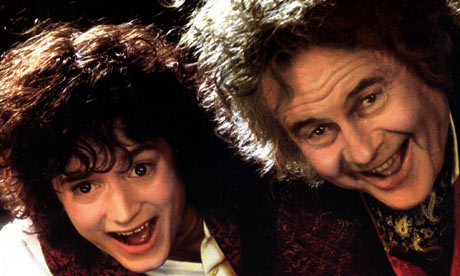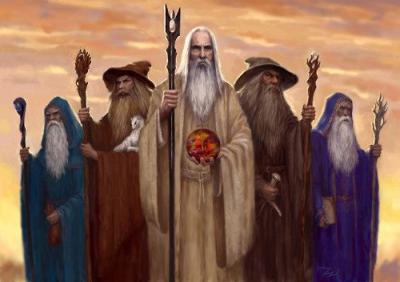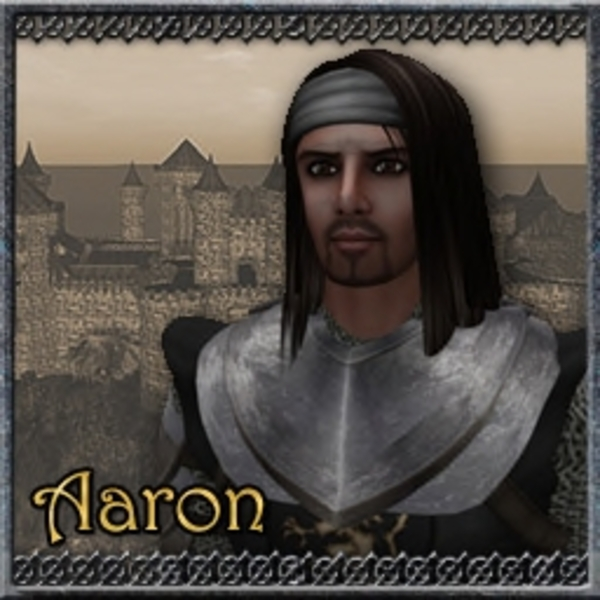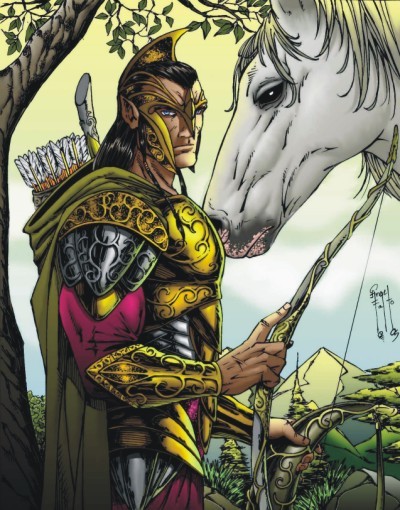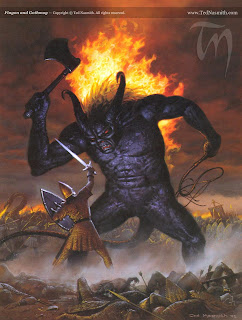This note was found in the
Tirion library in Second Life. Who wrote it exactly, I cannot tell, but twas likely a Noldo.
--------------------------
Noldor in Valinor
The Noldor are accounted the best of the Elves and all the peoples in Middle-earth in lore, warfare and crafts.
In Valinor "great became their knowledge and their skill; yet even greater was their thirst for more knowledge, and in many things they soon surpassed their teachers.
They were changeful in speech, for they had great love of words, and sought ever to find names more fit for all things they knew or imagined."
They were beloved of Aulë the Smith, and were the first to discover and carve gems.
On the other hand, the Noldor were also the proudest of the Elves; and, by the words of the Sindar, "they needed room to quarrel in".
Their chief dwelling-place was the city of Tirion upon Túna.
Among the wisest of the Noldor were Rúmil, creator of the first writing system and author of many epic books of lore.
Fëanor, son of Finwë and Míriel, was the greatest of their craftsmen, "mightiest in skill of word and of hand",and creator of the Silmarils.
The Noldor earned the greatest anger of Melkor, who envied their prosperity and, most of all, the Silmarils.
So he went often among them, offering counsel, and the Noldor hearkened, being eager for lore.
But Melkor sowed lies, and in the end the peace in Tirion was poisoned. Fëanor, having rebelled against Fingolfin his half-brother, was banished, and with him went Finwë his father.
Fingolfin remained as the ruler of the Noldor of Tirion.
But Melkor had yet other designs to accomplish.
Soon after with the aid of Ungoliant he slew the Two Trees, and coming to Formenos he killed Finwë, stole the Silmarils and departed from Aman.
Fëanor then, driven by the desire of vengeance, rebelled against the Valar and made a speech before the Noldor, persuading them to leave Valinor, follow Melkor to Middle-earth and wage war against him for the recovery of the Silmarils.
He swore a terrible oath to pursue Melkor and claimed the title of the High King; but though the greater part of the Noldor still held Fingolfin as King, they followed Fëanor to be not separated from their kin.
Exile to Middle-earth
The Noldor led by Fëanor demanded that the Teleri let them use their ships.
When the Teleri refused, they took the ships by force, committing the first kinslaying.
A messenger from the Valar came later and delivered the Prophecy of the North, pronouncing Doom on the Noldor for the Kinslaying and rebellion and warning that if they proceeded they would not recover the Silmarils and moreover that they all will be slain or tormented by grief.
At this, some of the Noldor who had no hand in the Kinslaying, including Finarfin son of Finwë and Indis, returned to Valinor, and the Valar forgave them.
Other Noldor led by Fingolfin (some of whom were blameless in the Kinslaying) remained determined to leave Valinor for Middle-earth. Prominent among these others was Finarfin's son, Finrod.
The Noldor led by Fëanor crossed the sea to Middle-earth, leaving those led by Fingolfin, his half-brother, behind.
Upon his arrival in Middle-earth, Fëanor had the ships burned. When the Noldor led by Fingolfin discovered their betrayal, they went farther north and crossed the sea at the Grinding Ice which cost them many lives. With the Two Trees destroyed by Melkor, the departure of the Noldor out of the Undying Lands marked the end of the Years of the Trees, and the beginning of the Years of the Sun when the Valar created the Moon and the Sun out of Telperion's last flower and Laurelin's last fruit.
Fëanor's company was soon attacked by Morgoth. When Fëanor rode too far from his bodyguard during the Battle under Stars, he was attacked by several Balrogs including their Lord Gothmog, who had issued forth from Angband, the enemy's fortress in the north. Despite a valiant fight, Fëanor he was mortally wounded and would have been captured and taken to Angband had it not been for the swift arrival of his sons. However Fëanor died whilst being taken back to his own people.
Because Fëanor had taken the ships and left the Noldor led by his half-brother on the west side of the sea, the royal houses of the Noldor were feuding, but Fingon son of Fingolfin, saved Maedhros, son of Fëanor, from Morgoth's imprisonment and the feud was settled. Maedhros was due to succeed Fëanor, but he regretted his part of the Kinslaying and the abandonment of Fingolfin and left the High Kingship of the Noldor to his uncle Fingolfin because he was the eldest, who became the first High King of the Noldor in Middle-earth. His brothers did not agree to this, and began to refer to themselves as the Dispossessed, because the High Kingship had passed them by. It should be stressed that after the fall of Fingolfin that there is little evidence that the Feanorians respected the command of his successors.
In the north-west of Middle-earth the Noldor made alliance with the Sindar, the Elves of Beleriand, and later with Men of the Three Houses of the Edain. Fingolfin reigned long in the land of Hithlum, and his younger son Turgon built the Hidden City of Gondolin. The Sons of Fëanor ruled the lands in Eastern Beleriand, while Finrod Finarfin's son was the King of Nargothrond and his brothers Angrod and Aegnor held Dorthonion. Fingolfin's reign was marked by warfare against Morgoth and in the year 60 of the First Age after their victory in Dagor Aglareb the Noldor started the Siege of Angband, the great fortress of Morgoth. In the year 455 the Siege was broken by Morgoth in the Battle of Sudden Flame, in which the north-eastern Elvish realms were conquered. Fingolfin in despair rode to Angband and challenged Morgoth to single combat. He dealt Morgoth seven wounds but perished, and he was succeeded by his eldest son Fingon, who became the second High King of the Noldor in Beleriand.
In the year 472, Maedhros organised an all-out attack on Morgoth and this led to the Nírnaeth Arnoediad, the Battle of Unnumbered Tears. Betrayed by the new-come Easterlings, and surrounded by the forces of Morgoth, the Noldor, Sindar and Edain were utterly defeated. Fingon the Valiant was slain by Gothmog and other Balrog; he was succeeded by his brother Turgon.
Morgoth scattered the remaining forces of the Sons of Fëanor, and in 495 Nargothrond was also overridden. Turgon had withdrawn to Gondolin which was kept hidden from both Morgoth and other Elves. In 510, Gondolin was betrayed by Maeglin and sacked. During the attack Turgon was killed; however, many of his people escaped and found their way south. Turgon had no sons, so Gil-galad, last surviving male descendant of Fingolfin, became the fourth and last High King of the Noldor in Middle-earth.
Finally the Valar came to Middle-earth and in the years 545-583 the War of Wrath was fought and Morgoth was cast into the Void. But Beleriand sank into the sea, except for a part of Ossiriand (Lindon), and a few isles. The defeat of Morgoth marked the end of the First Age and the start of the Second.
Second and Third Ages
Most of the Noldor sailed back to Aman at the End of the First Age; but some, like Galadriel (daughter of Finarfin) or Celebrimbor (grandson of Fëanor), refused the pardon of the Valar and remained in Middle-earth. Gil-galad founded a new kingdom at Lindon, and ruled throughout the Second Age, longer than any of the High Kings except for Finwë. He was also accepted as High King by the Noldor of Eregion. But after a while Sauron had replaced his master Morgoth as the Dark Lord. With the aid of the Ruling Ring he fortified Mordor and began the long war with the remaining Elves. He attacked Eregion, destroying it, but was withstood in Rivendell and Lindon. With the aid of the Númenóreans, the Noldor managed to defeat him for a time.
However, in the year 3319 of the Second Age Númenor fell due to Ar-Pharazôn's rebellion against the Valar, in which Sauron had a great part. When Elendil with his sons escaped to Middle-earth and established the realms of Arnor and Gondor, Sauron tried to conquer Gondor before it could take root. Both Elendil and Gil-galad set out for Mordor in the Last Alliance of Men and Elves and defeated Sauron in the Battle of Dagorlad and finally in the Siege of Barad-dûr. There Gil-galad perished, and so ended the High Kingship of the Noldor. No new High King was elected, as no one claimed the throne; for this reason, the High Kingship of the Noldor was said to have passed overseas, to the Noldor of Valinor, ruled by Finarfin, the third son of Finwë who had never left. In Middle-earth of the descendants of Finwë only Galadriel and Elrond Half-elven remained (and the Númenórean Kings through Elrond's twin brother Elros).
In the Third Age, the Noldor in Middle-earth dwindled, and by the end of the Third Age the only big communities of Noldor remaining in Middle-earth were in Rivendell and Lindon. Their further fate of fading utterly from the World was shared by all Elves.
High Kings of the Noldor
In Valinor:
Finwë, first High King
Fëanor, first son of Finwë; claimed the title after his father's death
Fingolfin, second son of Finwë; held to be the High King by the majority of the Noldor
Finarfin, third son of Finwë; ruled the Noldor remaining in Aman
In Middle-earth:
Fingolfin, after Maedhros son of Fëanor gave up his claims
Fingon, first son of Fingolfin
Turgon, second son of Fingolfin.
Gil-galad, son of Orodreth, son of Angrod, the last High King of the Noldor in exile.
It is not known exactly how Finwë became High King: he may have been a descendant of the Noldorin primogen "Tata", or simply have been accepted as leader based on his status as ambassador to the Valar. The Noldor had many princely houses besides that of Finwë: Glorfindel of Gondolin and Gwindor of Nargothrond, while not related to Finwë, were princes in their own right. These lesser houses held no realms, however: all the Noldorin realms of Beleriand and later Eriador were ruled by a descendant of Finwë.
The Mannish descendants of Elros (the Kings of Arnor) now claimed the title High King, although there is no indication that this referred anything other than a High Kingship over the Dúnedain. As descendants through the female line Elros and his brother Elrond were not considered eligible, and Elrond indeed never claimed Kingship.
It is perhaps notable that Galadriel, the last of the House of Finwë in Middle-earth (other than the Half-elven) and Gil-galad's great-aunt, likewise never claimed a king title let alone the title of High Queen. Indeed the only known Elven Kingdom in Middle-earth after the Second Age was the Silvan realm of Mirkwood, ruled by the Sinda Thranduil.

